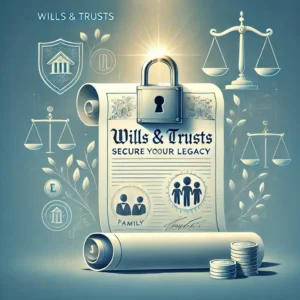The global wills and trusts market is gathering upward momentum. Among the growth drivers are key demographic shifts and increasing wealth accumulation.
This industry, estimated at $49.9 billion in 2025, is expected to rise in the next few years. The UK market alone reached an estimated £2.81 billion in 2024.
Estate planning has grown in importance to 56% of adults in the US. Despite that, only 33% have formalized their plans. This represents a critical gap in preparedness.
The aging population and evolving family structures have prompted people to seek these.
If you are looking to invest as an expat or high-net-worth individual, which is what I specialize in, you can email me (advice@adamfayed.com) or WhatsApp (+44-7393-450-837).
This includes if you are looking for a second opinion or alternative investments.
Some of the facts might change from the time of writing, and nothing written here is formal advice.
For updated guidance, please contact me.
It is important to understand Wills and Trusts, including specialized options such as offshore trusts.
To put it succinctly, the protection of your legacy and making sure that your wishes are carried out according to your design.

What Are Wills and Trusts?

A will is a legal document that guides the distribution of your assets upon death.
A trust, on the other hand, is a legal arrangement that manages your assets both during and after your lifetime.
Both play critical roles in estate planning. However, they offer different advantages and levels of protection for your assets.
Wills provide simple instructions regarding asset distribution. Trusts provide greater control and privacy in managing your estate.
These are important differences that need to be appreciated in order to make the right choices.
They are the heart of your estate planning.
Trust Types
There are various types of trusts available in modern estate planning to address different needs. There are also different ways to categorise trusts. Some of these include:
- Living Trusts
Living trusts are created during your lifetime. They can either be revocable or irrevocable.
These trusts allow flexibility in the management of assets while avoiding probate. They are thus popular among estate planners.
- Revocable Trusts
These trusts are amendable or terminable at any time during your life. Thus, it retains flexibility and provides control over the assets.
Especially ideal for those wanting to retain control of their estate. Revocable trusts allow easy transition of the assets.
- Irrevocable Trusts
These, once formed, are unchangeable. This therefore provides rigid protection of assets and also has potential tax benefits attached.
They are most especially ideal for high net-worth individuals as a strategy for reducing estate tax.

Other Types of Trusts:
- Charitable Trusts: To provide for charitable organizations and their causes.
- Special Needs Trusts: To provide for individuals with disabilities/special needs.
- Asset Protection Trusts: To protect assets from possible creditors or lawsuits.
- Qualified Domestic Trusts (QDOTs): So that the non-citizen spouse can take advantage of marital tax deductions.
- Business Trusts: Set up for business use and purposes.
Another type of trust that is gaining in popularity is the Offshore Trust. Let’s narrow it down to that specifically.

Offshore Trusts
Offshore trusts are an advanced estate planning tool. They offer more asset protection and privacy.
They are set up in friendly foreign countries with favorable trust laws. This adds more layers of protection to your assets.
Some of the major benefits of offshore trusts include:
- Better asset protection
- Greater privacy
- International investing opportunities
- Favorable trust laws
- Potential tax reductions
Offshore trusts have gained much popularity among high-net-worth individuals seeking the ultimate in asset protection.
These are created in places like the Cayman Islands, Cook Islands, or Bermuda. All these are known for their solid trust laws and financial privacy laws.
For one to consider an offshore trust, the following must be realized:
1. Legal Framework:
One must ensure that the domestic and international laws are adhered to.
2. Tax Implications:
Consideration of reporting and tax obligations.
3. Asset Protection:
Level of protection in the various jurisdictions
4. Cost Considerations:
Count set-up and maintenance costs
Comparison: Wills vs. Trusts
The important differences need to be understood for effective estate planning:

Privacy
- Wills become public records after death
- Trusts are private throughout the duration
Cost
- Generally, wills are less expensive to set up initially
- Trusts may cost more upfront but have long-term savings in some cases
Control
- Wills are only effective after death
- Trusts manage and control your assets during your lifetime
Probate
- Wills need to be probated
- Trusts, for the most part, avoid probate and save time and money
When to Use Each Option
A will or trust all depends on your situation:
Choose a Will If:
- You have an uncomplicated estate
- Cost is first and foremost
- You’re comfortable with probate
- Simplicity is preferred
Choose a Trust If:

- Probate avoidance is desired
- Privacy is paramount
- You have complicated assets
- Lifetime asset management is desired
Consider an Offshore Trust If:
- Better asset protection is needed
- International investment is required
- Privacy is utmost important
- You have substantial assets
Professional Expertise
No one can underestimate the role of knowledge of wills and trusts.
Professional expertise makes your estate plan a success. It assures that the plan meets your objectives and adheres to applicable laws.
Consult with:
- Wills and trust attorneys
- Estate planning lawyers
- Tax consultants
- Financial advisors
- International trust experts

Conclusion
Estate planning can be overwhelming with all the concerns of making the right decisions regarding wills, trusts, and long-term asset protection.
There is a solution for every need.
Whether it be for the support of causes dear to your heart or knowing that those you love and care most about are provided for.
Seeking asset protection or just trying to understand what asset protection trusts are all about?
Perhaps you’d like access to an offshore trust? With which comes enhanced privacy and protection under favorable international legislation.
Unique circumstances, such as those of non-citizen spouses, can be helped through qualified domestic trusts (QDOTs), especially for taxes.

Business trusts also help streamline operations for business owners while protecting your interests.
As indicated, the right approach to estate planning makes all the difference.
Peace of mind through estate planning with wills and trusts, and all that comes with it, protects your legacy.
Yes, this includes the offshore options, too.
The trick is to get an early start and review your plan every now and then. Be it a basic will, domestic trust, or offshore trust arrangement.
Frequently Asked Questions
Q: What’s the difference between wills and trusts?
Answer: A will gives away the assets when one dies by going through probate. A trust usually controls the assets during life and at death, mostly bypassing probate.
Q: What does it cost to set up a trust?
Answer: Basic trusts run about $1,500-$3,000; however, complex or offshore trusts can be $10,000 or more. Keep in mind that this is a ballpark figure. Prices do vary.
Q: Are offshore trusts legal?
Answer: Offshore trusts are legal. However, they must be properly set up, and the reporting requirements and/or tax obligations must be followed.
Q: Do I need a will and trust?
Answer: Many people benefit from both. Especially as they have related yet different purposes in an overall estate plan.
Pained by financial indecision?

Adam is an internationally recognised author on financial matters with over 830million answer views on Quora, a widely sold book on Amazon, and a contributor on Forbes.



